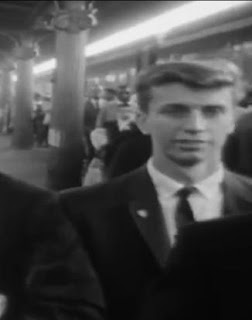On this site I recorded some recollections of the 1963 March on Washington for Jobs and Freedom on its 40th anniversary. The 50th was just celebrated, and I wrote a new piece about it that was published in a few places.
Rather than repeat any of that I've just put together links here. At Kowincidence I posted both my 2013 remembrance and my brief essay published shortly after the March in 1963, when I was 17. At Dreaming Up Daily I posted about the 50th anniversary event at the Lincoln Memorial, including further thoughts on the significance of this historically shining day (for me and for the country) and President Obama's speech.
In that earlier post here on the March on Washington, I joked that if you looked real hard you could see me on the left side of the reflecting pool, about halfway down and towards the trees. It's a joke of course because there are 250,000 or so people in those photos.
However when I started writing about that day this time, I decided to test certain memories (and things others had written) against what video there might be on that startling new invention, YouTube. The first video I looked at was this one, which appears to be a documentary shot for the United States Information Agency with some footage that may or may not have been used. (It's called stock footage on YouTube.)
I was going through it when I heard sounds familiar from a train station, and saw the logo of a Pennsylvania Railroad train. I rewound and slowed down the footage of marchers arriving at Washington's Union Station, and was startled (to say the least) to actually see my 17 year old self, walking towards the camera.
I immediately thought I remembered it happening, and even someone else in the shot, though my impression was that it was someone I met on the train, and never saw again. Anyway, there actually is a photographic record--a few frames of moving picture--of me arriving for this historic event, among 250,000 other people. I'm at the 11:32-11:35 marks approximately, on the far right of the picture, looking past the camera but then as I'm passing, towards it as I start to smile. (I had a smile then.)
I found this alone in the middle of the night, so it still didn't seem quite real. Now I guess it is.
I wanted the piece I wrote this year to be true to my perspective at the time and to what I actually remembered. But I also wanted it to be about the event, and not about me.
So I didn't get into the question of why a white Catholic boy was there, beyond quoting President Kennedy calling it a moral issue, and a promise made in the Constitution that was not yet kept. I felt both of those reasons passionately.
What didn't even occur to me at the time, and which I cannot even now properly evaluate, is a simple fact of my experience: I grew up next door to an African American family. We lived on what was virtually a new street just outside of the Greensburg (PA) city limits, and our houses were the first built there. There were two black families on the street. The family next door had a boy about my age, and together with the two white brothers who were next-door neighbors on the other side, we spent a lot of time together. We played our elaborate cowboy and war and science fiction scenarios from TV shows and movies, we played baseball and football, traded baseball cards, we explored and talked about the mysteries of life and so on. I recall going with him once or twice to his church, and being welcomed at a church dinner there. His mother and especially his father were friendly to me.
This was through the grade school and junior high years, though we always went to different schools. When we went to our different high schools we all saw less of each other. High school was very absorbing. I suppose all of this informed how I saw the early Civil Rights struggles in the south--the freedom riders and so on. But by high school my beliefs on the subject were informed in other ways, and oddly or not, I seldom thought of my friend and his family in relation to the struggles against segregation, and for voting rights and other elements of racial justice. But especially since there were no African Americans in my high school and I can't recall that there were in any of my schools, these experiences must have been influential in some way. If only that I was not uncomfortable in the presence of African Americans.


No comments:
Post a Comment